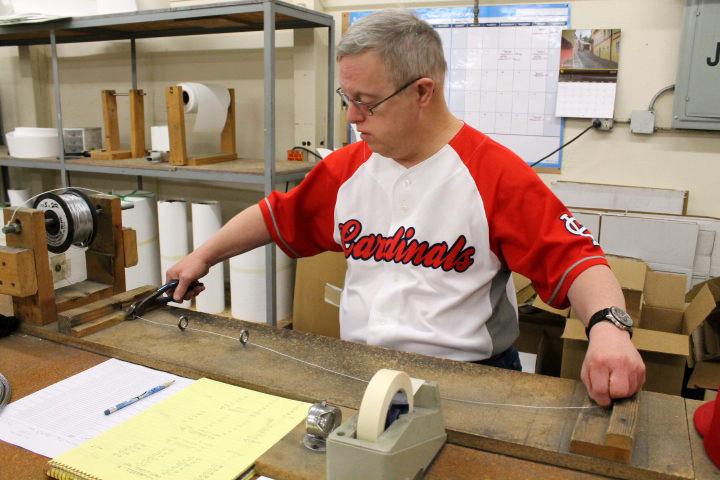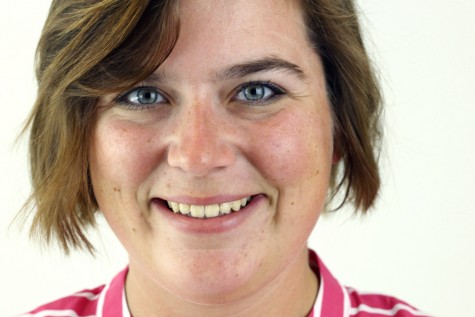CCAR manufacturing offers job skills, opportunities
Joe Carlen, a consumer at CCAR Industries, cuts wire in the manufacturing warehouse at the main building Tuesday. Carlen has been a CCAR consumer and employee for over 10 years.
April 16, 2015
All around CCAR Industries’ manufacturing plant, people can be seen working with metal, tools and other materials to make various products shipped to companies around the area.
Different machines and carts can also be seen and heard as they transport materials all around the spacious plant.
CCAR is a not-for-profit organization that provides a variety of services for people with developmental disabilities and other functional limitations.
It has other facilities as well, including one for recycling.
Many of the people who work to create and make products at CCAR’s manufacturing plant have developmental disabilities.
Chastity Parker, coordinator for CCAR’s manufacturing plant, said people who work at the plant want the people with developmental disabilities to have as normal of a life as possible.
“We want them to be a part of the community, not just part of the group home,” she said.
Much of the work done at the manufacturing plant at CCAR has to do with putting objects together, shrink wrapping, pouring wax, cutting and stripping wire, assembling gaskets, and more.
Karen Torbeck, production manager of the plant, said the plant sends samples of silica all over the world.
“These are places I’ve never even heard of,” Torbeck said.
UPS picks up anywhere from 5 to 50 boxes of silica a day.
Accident reports at CCAR manufacturing are low, something Torbeck said is because of the supervision of the people who work there.
“They are supervised so well,” she said.
Supervisors make sure those who work at the plant have good hand-eye coordination and understand safety.
Workers are placed in their positions based on their own preference and where they would fit best.
“We think, ‘Oh, they’d be great at this place, but they might be overwhelmed by the noise,’” Parker said. “We give them that choice as well.”
CCAR has been outsourcing to manufacturing companies since the 1970s. Roy Cuppy is CCAR’s building contractor and has been working for CCAR since it first opened.
“It was a bowling alley and a restaurant before that,” Cuppy said.
He said it took most of the summer to turn it into the manufacturing plant it is today.
CCAR Industries also has a recycling program where community members and local businesses bring paper, cardboard, aluminum and plastic materials to be processed and recycled. Those who work there spend time shredding and then processing the recyclables into compact squares using balers. The biggest one they make are 25,000 pounds.
Angie King, who manages the recycling center, said the center will take almost anything that needs to be recycled if its made with the right material.
“If it’s got some kind of paper, we’ll take it,” King said.
Students from Eastern recycle a lot; although some of the things they recycle can be questionable, she said.
“We’ve found beer cans, drugs, money,” she said. “You name it, college students will recycle it. We’ve found $100 once.”
People can drop off what they need to recycle 9 a.m. to 2 p.m Monday through Friday.
CCAR also offers residential areas for people with developmental disabilities.
Jenny Munro, the director of residential services, said CCAR has group homes for adults and children.
The group homes have 49 adults and seven children who are also separated by age group.
Parker said she sees an increase in independence in those who work at the manufacturing plant.
“They earn wages, they get self esteem in working,” she said.
Those who work in the plant are able to gain skills that allow them to work in restaurants and stores around Charleston.
“They learn basic work skills, how to show up one time, take directions, ask questions,” Parker said. “They learn social skills that are needed in life to be successful.”
Munro said 50 to 70 percent of the people who work with residents at CCAR are Eastern or Lake Land College students.
“We are always looking for people to work in the residential homes, and they are encouraged to apply,” Parker said.
To apply, a high school diploma is needed, and 120 hours of paid training are offered, with 40 hours in the classroom and 80 on the job.
Cassie Buchman can be reached at 581-2812 or [email protected]

















































